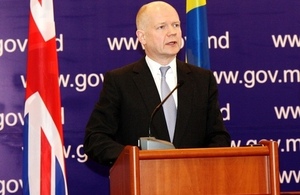Foreign Secretary reflects on Moldova and regional instability
An Op-ed by Foreign Secretary William Hague published upon his arrival to Moldova.

Foreign Secretary William Hague in Moldova.
The EU and Moldova: In vino veritas!
In autumn last year, the UK’s wine-drinking community was up in arms over a decision by Russia to ban the import of wines from Moldova. The decision was “unfounded”, according to leading wine journal Decanter. It was “Russian bullying”, according to The Economist.
The implication was that Moscow was acting in retribution for Moldova’s decision to sign an Association Agreement with the European Union.
I’m pleased that the EU acted so quickly in response. After fast-tracking measures through the Brussels institutions, Moldovan wines went on sale in Europe entirely duty-free from New Year’s Day.
I hope that as this Association Agreement takes effect, we will see many more products from Moldova on British shop shelves, and that over time, our trade will increase. Experience from other countries shows this is the most likely course of events.
Last week, we marked ten years since the 2004 wave of EU enlargement.
The impact on Poland has been that its trade with the UK has trebled to £5.7 billion a year, and incomes within the country have risen three-fold. A country that in 1989 had bare shop shelves and 500% inflation is now the sixth biggest economy in Europe, and it has been one of the fastest-growing.
This did not happen overnight for Poland or any of the former eastern bloc states. It was a long, difficult process that required the dedicated commitment of a generation of political leaders, who had to take hard decisions in areas such as judicial reform and tackling corruption. The same is true of Moldova, and I commend the Government for the steps it has taken to date. The UK stands ready to help as Moldova continues down this path.
The EU has an impressive track record of boosting living standards in the countries with which it trades, and I think that deciding to sign an Association Agreement has unquestionably been the right decision for both sides.
But Moldova shouldn’t have to choose whether to do business with East or West. A stable and prosperous Moldova, doing business across all its borders, is in the interests of every country in the region.
The economy is an important link between Europe and Moldova, but so too are our shared democratic values.
It has been almost a quarter of a century since Moldova won its independence from the Soviet Union, followed by the first post-communist elections in 1991.
Much has changed in Moldova since then, and a generation has passed.
Britain is deeply grateful for the contribution made by your armed forces to the Partnership for Peace programme in Afghanistan and Kosovo.
Yet within this region, some would like to turn the clock back and reverse the gains of the last quarter century. By fixing their gaze backwards, they are missing the fact that Europe has moved on.
Young people in Moldova or Ukraine cannot remember a life under Soviet rule.
Opinion polls from Ukraine this month indicate that the vast majority of people, including Russian-speakers in the south-east, want to remain as Ukrainian citizens.
The fact is that in a modern Europe, where there are disputes, there are legal means to resolve them.
Where you have minorities, you have European standards of human rights to protect them.
Where there is economic hardship, Europe has been ready to open its economy, the largest in the world, to help its neighbours trade their way to prosperity, and it does not do so on an exclusive basis.
It is in everyone’s interests that tensions in this region subside, including in Transnistria. It is important that the de facto authorities in Tiraspol continue to negotiate, and do so in a constructive way. The United Kingdom and our partners will always support Moldova’s territorial integrity and sovereignty.
As elsewhere, Ukraine must be allowed to find its own way through to the democratic elections that will take place in less than three weeks’ time, and beyond that to stability and prosperity.
Instability in Eastern Europe is in no-one’s interest. We look to Russia to take the necessary steps to de-escalate the situation, pulling back its troops and implementing the Geneva agreement. Moscow must know that if it doesn’t, this time it will be its own economy that bears the brunt.